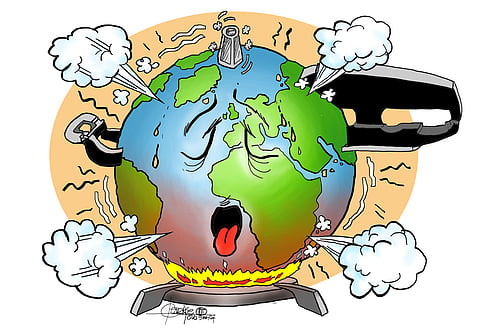
- NEWS
- the EDIT
- COMMENTARY
- BUSINESS
- LIFE
- SHOW
- ACTION
- GLOBAL GOALS
- SNAPS
- DYARYO TIRADA
- MORE

As the effects of climate change continue to intensify, the world finds itself entering a new era characterized not by global warming, but by a phenomenon that can be described as global boiling.
This term encapsulates the unprecedented rise in temperatures experienced across the planet, leading to extreme heatwaves, record-breaking temperatures, and widespread impacts on ecosystems, economies, and human health.
Metro Manila’s recent record-high temperature of 45 degrees Celsius serves as a stark reminder of the urgency and severity of this crisis, prompting a reevaluation of our understanding of climate change and its implications for the future.
The shift from global warming to global boiling signifies a qualitative escalation in the intensity and frequency of extreme heat events.
While global warming refers to the gradual increase in the Earth’s average surface temperature over time, global boiling represents a tipping point where temperatures soar to unprecedented levels, surpassing historical records and surpassing the adaptive capacity of both natural and human systems.
This transition is driven by a combination of factors, including the accumulation of greenhouse gases in the atmosphere, changes in land use and land cover, and feedback loops that amplify the warming effect.
In Metro Manila, the recent spike in temperatures to 45 degrees Celsius underscores the immediate and tangible impacts of global boiling on local communities.
Such extreme heat events pose serious risks to public health, exacerbating heat-related illnesses, heat stroke, and dehydration, particularly among vulnerable populations such as the elderly, children, and outdoor workers.
Moreover, the soaring temperatures can strain infrastructure and utilities, leading to power outages, water shortages, and disruptions to essential services, further compounding the challenges faced by residents already grappling with the impacts of climate change.
Beyond Metro Manila, the era of global boiling is unfolding on a planetary scale, with profound implications for ecosystems, biodiversity, and the functioning of the Earth’s systems.
Rising temperatures are triggering shifts in weather patterns, altering precipitation regimes, and increasing the frequency and intensity of extreme weather events such as hurricanes, droughts, and wildfires. These changes are disrupting ecosystems, threatening biodiversity, and undermining the resilience of natural habitats, with cascading effects on food security, water resources, and ecosystem services essential for human well-being.
In addition to environmental and societal impacts, the era of global boiling poses significant economic challenges, with implications for industries, livelihoods, and global supply chains.
Agriculture, for example, faces mounting pressures from heat stress, water scarcity, and shifting growing seasons, leading to reduced crop yields, decreased agricultural productivity, and increased food insecurity. Similarly, sectors reliant on outdoor labor and infrastructure, such as construction, transportation, and tourism, are vulnerable to disruptions caused by extreme heat events, posing risks to economic growth, employment, and livelihoods.
Addressing the challenges posed by the era of global boiling requires urgent and concerted action at the local, national, and global levels. Mitigation efforts aimed at reducing greenhouse gas emissions are essential to limit further warming and prevent the escalation of extreme heat events.
This necessitates transitioning to renewable energy sources, improving energy efficiency, and implementing policies to promote sustainable land use and decarbonize key sectors of the economy.
Adaptation measures are also critical to enhance resilience and protect communities from the impacts of extreme heat. This includes investing in heat-resistant infrastructure, expanding access to cooling technologies and urban green spaces, and strengthening early warning systems and emergency response mechanisms.
Furthermore, fostering collaboration and cooperation among governments, stakeholders, and communities is essential to mobilize resources, share knowledge, and implement effective solutions to address the multifaceted challenges of the era of global boiling.
Without saying so, the era of global boiling represents a defining moment in human history, marking a fundamental shift in the Earth’s climate system and posing profound challenges to society, the economy, and the environment.
Metro Manila’s recent record-high temperature serves as a sobering reminder of the urgency and severity of this crisis, underscoring the need for decisive and coordinated action to mitigate emissions, adapt to impacts, and build a more resilient and sustainable future for generations to come.
